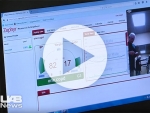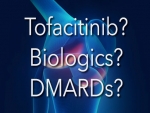Displaying items by tag: department of medicine
UAB researchers will use a $1.8 million grant to look at single cells for altered expression of the interferon gamma receptor gene.
Tagged under
Results show that JAK/STAT pathway inhibitors may be a new class of therapeutic treatments for patients with Parkinson’s disease. Acting by reducing inflammation, they prevent neurodegeneration in animal models and may be an important new approach to slow progression of the disease.
Tagged under
Part of the challenge is to do a better job of helping patients make their own, well-informed choices.
Tagged under
This protective effect on cardiotoxicity could benefit cancer chemotherapy recipients and heart failure patients.
Tagged under
UAB researchers probe basic molecular mechanisms that lead to the lung scarring of pulmonary fibrosis, a lethal disorder.
Tagged under
Measure of Mpl gene expression reveals a heterogonous population of leukemia stem cells: one group leukemic and the other group non-leukemic.
Tagged under
Study published in the American Journal of Gastroenterology shows fecal incontinence risk from anal intercourse is heightened for both women and men, with men almost three times as likely to experience incontinence.
Tagged under
UAB’s Landefeld named to government panel that helps determine recommendations on preventive health measures.
Tagged under
Tagged under
A new eight-week FreshStart! program is set for Jan. 21-March 10 to help cancer survivors make healthy lifestyle changes.
Tagged under
UAB-led research shows how methylating an RNA binding protein leads to alternative RNA splicing. Mutant enzymes are often found in blood cancers.
Tagged under
North Carolina resident Jerry Phillips has known since 2001 that he would one day need a kidney transplant. Fourteen years later, his need was fulfilled by a stranger and his transplant surgery performed by a friend.
The Central Alabama Caribbean American Organization shares Caribbean culture and is a resource for area students from the Caribbean.
Tagged under
 Telemedicine helps UAB take pulmonary rehabilitation into the home via smartphone technology, in an effort to reduce hospital readmissions from COPD.
Telemedicine helps UAB take pulmonary rehabilitation into the home via smartphone technology, in an effort to reduce hospital readmissions from COPD.
Tagged under
UAB leads a team that crafts new American College of Rheumatology guidelines for 2015 on treatment of rheumatoid arthritis.
Tagged under
Treating patients 50 and older with high blood pressure to a systolic blood pressure of less than 120 mm Hg reduced rates of cardiovascular events, including heart attack, heart failure and stroke, by 25 percent.
Tagged under
A drug derived from female hormones that may help soldiers survive major blood loss on a battlefield will undergo first human testing at UAB.
Tagged under



















